Oil & AMSOIL By Pass Filter Change on 67 VW Beetle

Click for larger image VW Beetle Oil Change, By-Pass Filter Change and Tightened Fan Belt Click larger I changed the oil and tightened the fan belt on my 67 VW Beetle. I installed AMSOIL Z-Rod Synthetic Motor Oil and changed the AMSOIL By Pass oil filter . AMSOIL Z-Rod protects flat tappet cams as well as protects from rust and corrosion for long periods of storage. AMSOIL Z-Rod Synthetic motor oil for classic cars or hot rods has extra zinc for the enhanced protection of the flat tappet camshaft this engine has. I had been using AMSOIL Dominator Racing Oil , but that's for 2,000 plus horsepower engines and this engine only has about 53 horsepower. Z-Rod gives great wear protection and its formulation enhanced with corrosion prevention additives. A much better choice for this little car. Click to enlarge On cars such as this, with older flat tappet cams, we need to avoid the API SN or API SM or newer oils as well as the ILSAC GF-5 or newer oils as these have greatly reduced the le...
